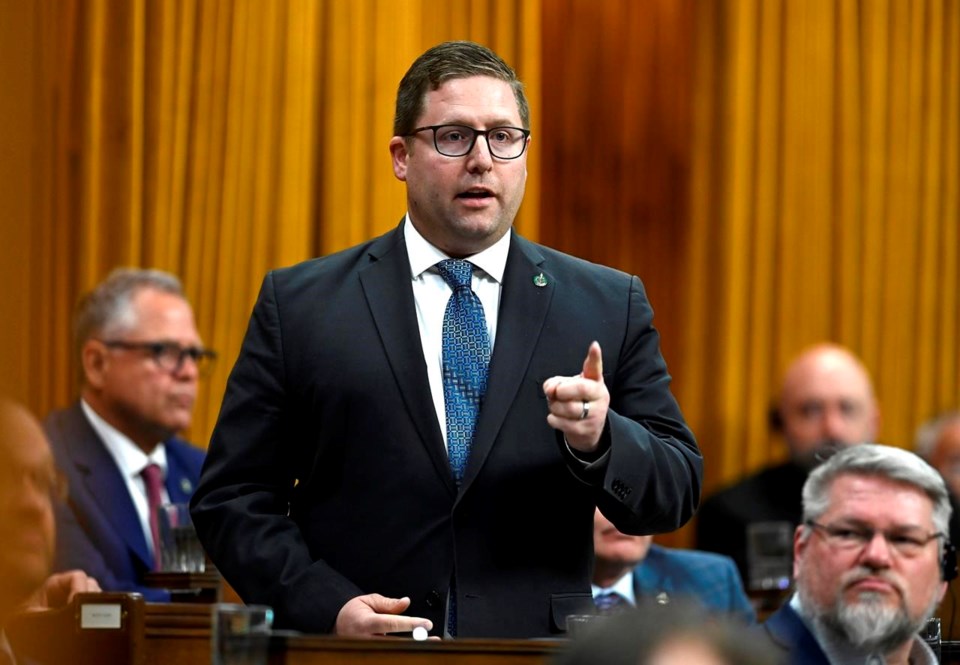OTTAWA — Conservative Leader Pierre Poilievre is rejecting the idea that his party played a role in granting $40 million in regulatory relief to Bell Media.
Conservative and NDP MPs backed a 2022 amendment to the Online Streaming Act, opposed by the governing Liberals, that allowed Canada's private broadcasters to save about $120 million a year in regulatory fees.
Bell's share of those savings was $40 million — the precise total of annual operating losses the broadcaster's parent, BCE Inc., cited when it slashed 4,800 jobs last week.
But Poilievre is now blaming Justin Trudeau for those cuts, and has called on the prime minister to claw back some of his government's federal grants to media companies.
When asked about the disconnect, the Conservative leader would only say that providing tax dollars to media outlets fuels biased, Liberal-friendly coverage.
"So the supposed justification for giving Bell all this money was that it was going to save media jobs. Well, they all got fired," Poilievre said Monday.
"So I guess that wasn't the real reason for giving tax dollars to the media. The real reason was for him to buy support from the media, which is what it actually did."
The June 2022 motion, introduced by Conservative MP John Nater, passed with the support of New Democrat and Bloc Québécois MPs on the House of Commons heritage committee without debate.
The motion sought to amend the Liberals' update to broadcasting law, the Online Streaming Act, so that it would abolish certain licensing fees.
Liberal MPs on the committee voted against Nater's motion, but the amendment was nonetheless written into the bill.
The act ultimately came into effect last April.
In a late-day statement to The Canadian Press, Conservative spokesman Sebastian Skamski called the amendment a "common sense proposal" to level the playing field between traditional broadcasters and online streaming platforms.
"On the other hand, Justin Trudeau and his Liberal government have handed out at least half a billion taxpayer dollars to Bell over the last eight years," Skamski said.
"This money was supposed to support Canadian jobs and Canadian media and yet the Liberals have squandered hundreds of millions of taxpayer dollars only to see the opposite results."
When asked to explain why New Democrat MPs voted with the Conservatives, NDP Leader Jagmeet Singh would only say that his party is opposed to government largesse for big corporations.
"I can tell you we have long said that any money that goes to any corporation should come with strong strings attached," Singh said.
"We have said that again and again and again."
Heritage Minister Pascale St-Onge didn't immediately respond to a request for comment. But in recent days, she has pushed back on social media against the claims from Poilievre and Singh that the Liberals are to blame.
She said it was the Tories who brought in the amendment to eliminate those fees for Bell.
"Liberals voted against it. This one is on you," St-Onge posted on X on Friday in response to Poilievre's attack. "As you can see, your policies are bad for workers and for journalism."
She also hit back against Singh, saying "hopefully you'll now understand that the Conservatives' ideas are never to the advantage of workers and even less for journalism."
Last week, St-Onge decried the company for breaking its promise to invest in news after it was granted the annual regulatory relief.
Bell Media is also expected to receive money because of the Online News Act, with private broadcasters to receive $30 million through a side deal the government struck with Google.
It agreed to pay news outlets $100 million a year to avoid being regulated under the new law, which requires tech giants to compensate news producers for content that is shared on their platforms, and from which they financially benefit.
The company had blamed its cuts on the federal government, saying Ottawa took too long to provide relief for media companies.
It also blamed the Canadian Radio-television Commission, saying the regulator is too slow to react to a "crisis that is immediate."
The CRTC is expected to release final regulations aimed at helping the news industry in the coming months. Until then, St-Onge said, "we need everybody to hold strong."
This report by The Canadian Press was first published Feb. 12, 2024.
Mickey Djuric, The Canadian Press



